Why Retreat?
From Edit-Crazy to Zen: Lucy van Smit shares her experience on the 2016 SCBWI Writer's Retreat.
At the start of this year, I planned to reward myself with the SCBWI retreat in May. I thought by then, I would have finished my YA novel, Hurts So Good. Actually, after the Bath Children’s Novel Award, I thought it would be sent out to the publishers who had asked to see it, and I would be basking in the bluebells, with a glass of prosecco. That was the plan. But come May, I was flailing in panic over edits from my agent, and going around in circles.
The retreat turned out to be a 10/10 experience. I came away calmer, inspired, and focused, with a strategy for my edits. Plus, my sides ached with laughter, and I had a bunch of new writing friends. Katya Bozukova’s review for Words & Pictures nails the alchemy the retreat creates from the setting, the cast of characters, and their goals. No surprise, the SCBWI retreaters were an awesome bunch.
When I got home, I tried to work out how the retreat got me out of my editing spiral. Was it just the laughter, the craft advice, and the synchronicity? Maybe. Every writer I spoke to, newbie, or published author, generously shared their experience.
Their advice was to call my agent and ask for clarification on the edits. Duh. I’d simply not asked enough questions, and my agent, the scarily talented Sallyanne Sweeney, assumed I knew why she liked my writing, as she was the competition judge, who had offered me representation. My fears were laid to rest, her edits were much closer to my original concept than I realised.
The publisher Rachel Mann told us this story of a writer who’d misunderstood her structural edits and rewritten her book, and lost what made it wonderful in the first place. Rachel said in the publishing world, editing doesn’t mean re-writing from scratch. How had I got it so wrong?
In business when you restructure a company, one approach is called Appreciative Enquiry, and the idea is to focus on what works well. The theory is if you improve the positive, say the 80% that is already successful, you will have a better return, than focusing on the negative 20%. And the technique they use is to ask questions, because the quality of the questions determines the culture. I suspect editing is the same, focus on what is working and improve that, otherwise the risk is we spend too much energy on what doesn’t work, and only marginally improve the book.
As writers we ask questions all the time, what does our main character want? What is her flaw? How will that prevent her getting her goal? And we break that story down scene-by-scene, asking better, and better questions, to get to the heart of the story.
In editing a TV documentary, a good rule is you only get to say one thing in a scene. One thing? It’s taken me decades to understand what that means. Think of you want to say, and then say it. Simply. Because, no matter how flashy the film looks, how much research you’d done, the question always asked is: what is the story?
My favourite observation on Masterchef is too many ideas confuse the dish. I knew this as a painter, I loved bold images, but I forgot to apply that to my editing.
The business strategist, Tony Robbins, bangs on about States of Mind, and how we can’t find the best creative solution, when our emotions hijack us, and we are anxious, pissed off and exhausted. He has a simple four-step approach to get out of a funk, and it explains why the retreat works so well.
On the retreat, the volunteers gave the most, but everyone helped someone. I walked around the gardens with Tania, spending an hour talking about her stories, it helped her to make a decision, and I felt glad I could return a favour.
Finally, the retreat gave me back my delight in putting words on a page, and learning my craft. So this is my go-to position: to remember I love writing, before I start work. And nurture myself with exercise, inspirational company, and lots of reading. Melvin Burgess’s advice made perfect sense, choose to be a good writer, before yearning to become an author.
LUCY VAN SMIT
Lucy’s YA novel, Hurts So Good, won the 2015 Bath Children’s Novel Award, and was shortlisted for the Caledonian Novel Award. After Art School, Lucy produced TV documentaries on Martin Amis, Ian McEwen, and John Le Carré, before realizing that writers were her tribe, and did an MA in Writing at Bath Spa. Represented by Sallyanne Sweeney, Lucy lives in London with her husband and teenage son. Her middle grade thriller, Invisible by Day, won the first SCBWI Slushpile Challenge. Lucy loves watching Netflix, claiming she’s researching tips on writing
.https://www.writersandartists.co.uk/2016/04/on-the-road-by-lucy-van-smit http://bathnovelaward.co.uk/2016/01/13/interview-with-lucy-van-smit-bath-childrens-novel-award-2015-winner/
At the start of this year, I planned to reward myself with the SCBWI retreat in May. I thought by then, I would have finished my YA novel, Hurts So Good. Actually, after the Bath Children’s Novel Award, I thought it would be sent out to the publishers who had asked to see it, and I would be basking in the bluebells, with a glass of prosecco. That was the plan. But come May, I was flailing in panic over edits from my agent, and going around in circles.
The retreat turned out to be a 10/10 experience. I came away calmer, inspired, and focused, with a strategy for my edits. Plus, my sides ached with laughter, and I had a bunch of new writing friends. Katya Bozukova’s review for Words & Pictures nails the alchemy the retreat creates from the setting, the cast of characters, and their goals. No surprise, the SCBWI retreaters were an awesome bunch.
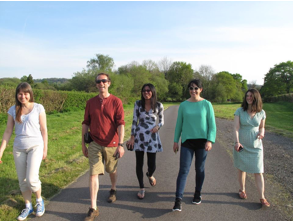 |
| Terri Trimble, Mike Pringle, Tania Tay (retreat organiser) Olivia Kiernan and Melissa Rogerson |
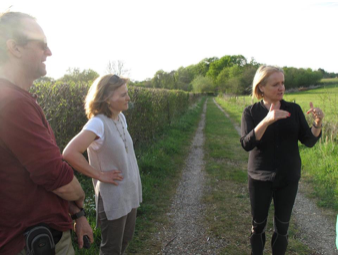 |
| Mike Pringle, Maria Farrer, Lucy van Smit |
The publisher Rachel Mann told us this story of a writer who’d misunderstood her structural edits and rewritten her book, and lost what made it wonderful in the first place. Rachel said in the publishing world, editing doesn’t mean re-writing from scratch. How had I got it so wrong?
In business when you restructure a company, one approach is called Appreciative Enquiry, and the idea is to focus on what works well. The theory is if you improve the positive, say the 80% that is already successful, you will have a better return, than focusing on the negative 20%. And the technique they use is to ask questions, because the quality of the questions determines the culture. I suspect editing is the same, focus on what is working and improve that, otherwise the risk is we spend too much energy on what doesn’t work, and only marginally improve the book.
As writers we ask questions all the time, what does our main character want? What is her flaw? How will that prevent her getting her goal? And we break that story down scene-by-scene, asking better, and better questions, to get to the heart of the story.
In editing a TV documentary, a good rule is you only get to say one thing in a scene. One thing? It’s taken me decades to understand what that means. Think of you want to say, and then say it. Simply. Because, no matter how flashy the film looks, how much research you’d done, the question always asked is: what is the story?
My favourite observation on Masterchef is too many ideas confuse the dish. I knew this as a painter, I loved bold images, but I forgot to apply that to my editing.
How the retreat shifted my bunker mentality.
The business strategist, Tony Robbins, bangs on about States of Mind, and how we can’t find the best creative solution, when our emotions hijack us, and we are anxious, pissed off and exhausted. He has a simple four-step approach to get out of a funk, and it explains why the retreat works so well.
- Read. Robbins advises feeding your mind, read an hour a day, read something you love, something that inspires you. And that will help shift your emotional state. I realised in my panic, I’d told myself I had no time to read, until I’d finished the edits. Removing one of my greatest pleasures had exacerbated my stress at a critical time. On the retreat, writers read their work to us, and talked about their favourite books, so we buzzed with inspiration the whole weekend.
- Get active. Robbins says fear feels physical, and you have to do something physical to change that emotional state. He advocates ten minutes of intensive activity to get your blood pumping. Again time poor, I’d stopped going to yoga, and breathing deeply. On the retreat, exercise was a blissful walk through bluebell woods. But at home, I reckon a burst of nutter dancing to music, in front of your desk, would do the trick, and put you in the right frame of mind.
- Spend time with inspirational people. Hah. You know where I am going with this. On a SCBWI retreat, this is a given.
- Contribute. Robbins argues that giving back, volunteering, is key to changing a negative emotional state. We appreciate what we have, and realise how small our problems are.
 |
| SCBWI volunteers - Alex English, Kathryn Evans, Teri Terry |
Finally, the retreat gave me back my delight in putting words on a page, and learning my craft. So this is my go-to position: to remember I love writing, before I start work. And nurture myself with exercise, inspirational company, and lots of reading. Melvin Burgess’s advice made perfect sense, choose to be a good writer, before yearning to become an author.
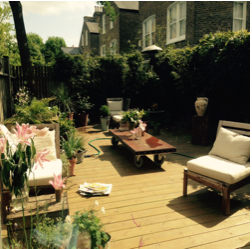 |
| Lucy van Smit’s back yard in South London |
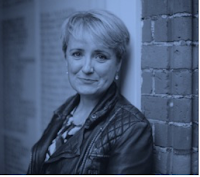 |
| @lucyvansmit |
.https://www.writersandartists.co.uk/2016/04/on-the-road-by-lucy-van-smit http://bathnovelaward.co.uk/2016/01/13/interview-with-lucy-van-smit-bath-childrens-novel-award-2015-winner/


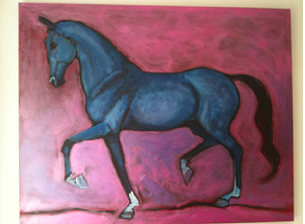









Thanks so much Lucy - a wonderful article and yes, that walk with you, thrashing out which story to write really helped me loads. So glad you came and that it was so helpful - volunteering for SCBWI events is so rewarding when you get such brilliant feedback. Plus it really was an amazing time... Roll on next year's retreat which the wonderful Mel Rogerson is organising! Txx
ReplyDeleteThe retreat definitely helped me - my agent has given me the thumbs up on the new edits and I am feeling chilled about tackling the second half of the book - all the best Lucy VS
DeleteIt's me who should be thanking you and Mel, not only for the hard work and high spirits AND inviting Melviin Burgess but the gracious, unassuming way you ran the event - it wasa delight Lucyx
ReplyDelete